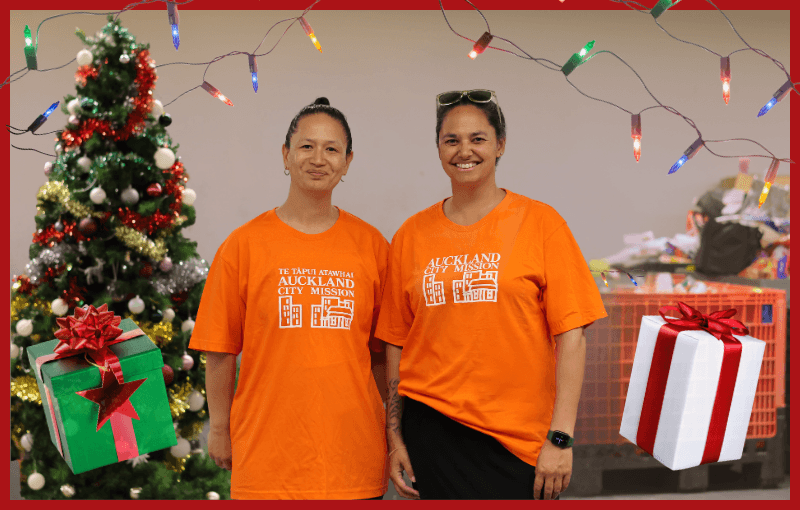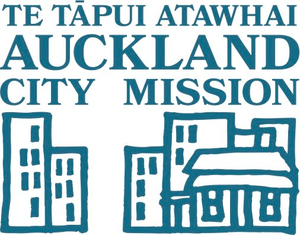Months of planning, scores of volunteers and thousands of food boxes are all part of Auckland City Mission – Te Tāpui Atawhai’s annual Christmas celebration. But without an ongoing funding commitment from the government, the future of this community support is uncertain.
Volunteer Uncle Mike arrives at Grafton’s Boston Road, the home of the Auckland City Mission’s food warehouse, by bicycle while proudly wearing a “vintage” City Mission shirt. Without skipping a beat, he parks his bike out back in the carpark-turned-community garden, and gets to sorting piles of vegetables that will help make up the food boxes feeding thousands of whānau over the festive season.
Uncle Mike is usually just known as Mike outside of the Mission, but as anyone who has worked in a majority Māori and Pasifika space knows, adding a family title is the highest honour you can give a co-worker. He started volunteering at the Mission in August 2020, following a move back home from Australia and a subsequent layoff at work. Rather than finding another job, Mike felt his energy would probably be more useful to the charity he had always known as an Auckland local.
“I’ve been through a number of [jobs and countries], and this [Auckland City Mission] by far would be the most supportive group of people I’ve ever worked with,” he says. “It’s been a useful way for me to reconnect with a larger part of Auckland and New Zealand than I otherwise might have. You often just stay in your own circle … and this gets me out and seeing people enjoying themselves, people struggling, and it’s a much wider cross section of society.”
In the Mission’s food warehouse, Mike spends his Friday weighing onions in between shelves dotted with canned goods, toiletries and hardy vegetables. In a few weeks, these items will be transported from Grafton to Eden Park where they’ll be assembled into festively wrapped food boxes for whānau. For nine days the stadium will be transformed into a distribution centre serving thousands of families – large, small, solo and new – who have received help through the City Mission.
Mike plans to be one of the 40 daily volunteers at Eden Park who will welcome and direct the families, and make sure the gift exchanges and other activations throughout the nine days go off without a hitch. Sure, maybe some think it’s an unconventional way to spend Christmas, but there’s also no better way to embody the spirit of the giving season.
“You can’t necessarily just accept that there’s always going to be inequality, because it’s always going to be the function of the structure [of our society],” Mike says. “You just change the structure.”
Ensuring kai sovereignty, and the festive spirit
Christmas almost looked like it wouldn’t come to fruition this year. With a drastic reduction in funding from the Ministry of Social Development (MSD), the Mission was facing the tough reality of needing to reduce the number of food boxes it distributes. The team knew this would leave many without support and result in a much leaner Christmas. The Mission requested additional funding from MSD and eventually received a portion of what was requested and needed.
Auckland City Mission general manager food security, Tara Moala, says the charity tries to improve on its Christmas offering as each one comes and goes. This is her first festive season with the Mission — she joined the charity four months ago, after working through the pandemic to provide kai sovereignty (reducing barriers to, and reclaiming knowledge of, Māori food knowledge and practices and consumption of nourishing kai), to communities. Moala felt taking her skills to the Mission would see this kaupapa achieved on a wider scale.
Moala says she sees food insecurity “everywhere” in Auckland, affecting families on the benefit, families with multiple full time workers and those in low income professions. “There’s lots of reasons for it … part of it is around the high cost of food, the cost of living generally, or because they just had to pay the rent,” she says.
Moala says the Mission will distribute 7,000 food boxes this December along with iwi partners Ngā Whare Waatea Marae and Papakura Marae. These boxes are packed according to the Kore Hiakai standard (each one can provide three meals across four days for four people with at least 80% of nutrition standards). Like the many families the Mission serves, these parcels will look different, but Moala’s particularly excited about one treat they’ve managed to get in there: the classic Christmas pavlova.
The Mission has already begun transporting kai from Grafton to Eden Park. While the volunteers sort and pack, the Mission’s staff have been contacting the families they have supported throughout the year to invite them to the celebrations.
This year, the Mission is aiming to make their gift exchanges feel less “transactional” and more dignifying, to ensure their families are able to fully experience the seasonal cheer. “We’re trying to grow the festivities of the season and encourage our whānau to really enjoy the time that they have with us,” Moala says.
To amp up the Christmas cheer, the team have set up a number of “activations” – or stalls – for whānau. These include face painting stations for tamariki and food stalls with kai to enjoy at home or at the event. There will also be information spaces for parents on finances and wellbeing hosted by The Kindness Institute and Tāmaki Budgeting. While tamariki are entertained, parents will be able to privately get gifts for their families.
“The thought around the informational activations isn’t to say, ‘do this, do this, do this,’” says team leader Anataia Fu. “It’s more about informing, because it’s a pretty odd time of year for our whānau … Some of the stuff we hear from our families around this time is, ‘we didn’t realise we’d get paid on this day, and now we’re dealing with this other stuff and we’re stuck for another week’. It’s hard to budget when you’ve got nothing to stay on budget.”
This will be the fourth year Fu has been involved with organising the Mission’s Christmas celebrations. She still remembers her first Christmas here, for which she roped in her young son to help with the volunteering effort. “[I] had a conversation with him that some families might be spending Christmas in their cars, for him to understand that we’re actually pretty fortunate and the whānau that are coming to our service and seeking support deserve to have the Christmas experience as well,” Fu says.
Christmas future
Moala says this year’s critical funding from MSD was a “saving grace” but without a clear, ongoing commitment from MSD, the future of Christmas 2025 and other important projects remains uncertain. While the Mission remains in conversation with the government, Moala and her team will have to start again from scratch when the new year arrives.
Fu says putting on an event of this scale is always “stressful”, but the knowledge that whānau are depending on their efforts, and that this Christmas could be the opportunity to spark hope for the new year, keeps the team pushing.
“There are definitely some moments where we’re all [feeling] a little bit hopeless, but actually, that’s not going to do anyone any good,” Fu says. “We’ve got to constantly check ourselves, like: ‘OK, tomorrow’s another day and we can start again, we can reset’, and we just gotta make sure that our community is doing that as well.”


